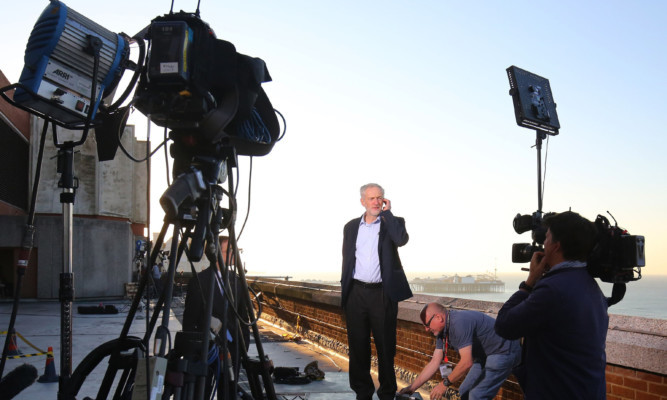Jeremy Corbyn has insisted that Labour is not a “divided party” despite major differences with his party’s MPs on the nuclear deterrent and military action in Syria.
The Labour leader stressed the size of the mandate he had been given to oppose Trident renewal even though “more than some” of his MPs disagreed.
Mr Corbyn also repeated his view that a political solution was needed in Syria because “you don’t solve every problem necessarily by going in and bombing”.
The Labour Party conference in Brighton will debate an emergency motion later opposing extending the UK’s military campaign against Islamic State militants into Syria without explicit authorisation by the UN.
Mr Corbyn, who made his opposition to Trident renewal one of the key points of his first leader’s speech at the conference, told ITV’s Good Morning Britain: “It’s not a divided party. I received 60% of the votes of all party members and supporters, it’s the biggest mandate any leader has ever been given in the Labour Party and I respect that mandate and I respect the people that voted for me.
“Yes, there are some Labour MPs – maybe more than some – who do not agree with me on my belief that we should not be renewing our nuclear fleet, the Trident system.
“We should instead be investing that money in high technology engineering and protecting jobs. But we should also be fulfilling our obligations under the nuclear non-proliferation treaty to take steps towards disarmament.
“That is a debate the party will be having and a debate where I put my points of view forward. There is nothing dishonest in having this open debate.”
Ahead of the debate on Syria, Mr Corbyn acknowledged that action against Islamic State – also known as Isil – was another issue where there was a split with his MPs.
“There are people in the party who have different views, but what we are all united on is that Isil’s behaviour, its actions and its brutality are totally appalling,” he said.
“There has to be an end to the fighting. There also has to be a cutting off of the funds and the arms that Isil are using, there has to be a ceasefire amongst the other forces within Syria.
“Maybe some progress has been made on that. You don’t solve every problem necessarily by going in and bombing. Basically all wars have to end with a political solution.”
Mr Corbyn did not mention immigration in his conference speech but shadow home secretary Andy Burnham will set out plans to win back Ukip voters by calling for tighter European Union movement rules to prevent wages being undercut by migrant workers.
The Labour leader said people should acknowledge the “great work that has been done by many people that migrated to our country” that has “helped our economic growth”.
But he told BBC Radio 5 Live that Labour also recognised “that we have got to invest in communities so there are not shortages of school places or doctors’ surgeries”.
Mr Corbyn insisted he supported aspiration but the rich had to pay their “fair share” of tax.
“People developing their lives, doing well, that’s good because they are also creating jobs, they are also working very hard and they are passing things on,” he said.
“But we have to have a tax system that is fair. We don’t at the moment, what we have is a government that is cutting tax credits for the very poorest and most vulnerable. Many families are losing £1,200 a year in benefits and the Government at the same time is reducing inheritance tax for those that have a large amount to leave to somebody else and also cutting corporation tax.
“I can’t see that that’s a fair way of doing things or a fair balance.”
Mr Corbyn said he had “learned a great deal from the great achievements of the Scandinavian countries in the way that they have developed very progressive social policies, very high stands of living and often very efficient manufacturing industry”.
The Labour leader also raised concerns about the health of the UK economy: “We don’t have a growing economy at the present time, we have an economy based on house price inflation and asset inflation rather than manufacturing industry.”
Mr Corbyn insisted he wanted to form a Labour government but said he would work with other parties in Parliament.
He said: “To try to defeat this Government on welfare reform, on the trade union legislation, obviously we will co-operate together with other parties to bring about, I hope, a better society in Britain.”
Asked whether he was positioning Labour too far to the left to win over the centre-ground voters the party will need to secure election victory, Mr Corbyn told PA: “Thirty-six percent of the electorate didn’t vote in the lastelection, 53% of young people didn’t vote in the last election.
“Some people were tempted away from us because we were not clear enough on an economic strategy that opposed austerity.
“Instead of cutting, we want to see an expanding economy, an investment-based economy – John McDonnell set that out in his speech on Monday.
“We have a different economic strategy, an economic strategy which actually rebalances our economy, invests in the social needs – particularly in housing, which in turn creates a large number of jobs – invests in infrastructure, which both creates jobs and provides economic opportunities for the growth of manufacturing industry in our economy.
“We need to rebalance things. We have a £100 billion trade deficit at the present time.
“We have a very low level of investment in our economy. We have a grossly unequal society with the cuts in child tax credits and family tax credits.”
